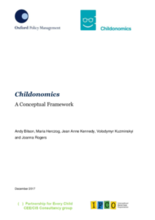Executive summary
This paper presents the conceptual framework for the Childonomics research project, which has developed the first iteration of a methodology that helps people to reflect on the long-term social and economic return of investing in children and families within a given national or sub-national context.
The first section of the paper describes how a rights-based approach is fundamental to ensuring that a broad view of the investments in children and families is considered, and provides an overview of the ways in which child and family support policies have changed in various countries in recent history from a family support model to a child protection approach focused on individual responsibility.
The second section describes the Childonomics framework, which is a way of looking at investments and outcomes across a range of services from universal through targeted, specialised, and highly specialised to alternative care services. The framework offers a way of illustrating how available and accessible services can lead to a range of outputs or outcomes for children, families, communities, and society at large. This section also discusses the challenges of measuring outcomes in a range of settings.
The third chapter of this paper draws on available evidence to populate an illustrative Childonomics framework with services and programmes, outcomes and indicators. This framework is not normative or definitive, but provides for purely illustrative purposes a resource for users of the Childonomics methodology, allowing them to consider the range of available evidence and how nuanced the evidence can sometimes be in terms of context, sample-size, and external validity.

